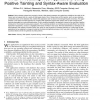Free Online Productivity Tools
i2Speak
i2Symbol
i2OCR
iTex2Img
iWeb2Print
iWeb2Shot
i2Type
iPdf2Split
iPdf2Merge
i2Bopomofo
i2Arabic
i2Style
i2Image
i2PDF
iLatex2Rtf
Sci2ools
TSE
2008
2008
WASP: Protecting Web Applications Using Positive Tainting and Syntax-Aware Evaluation
Many software systems have evolved to include a Web-based component that makes them available to the public via the Internet and can expose them to a variety of Web-based attacks. One of these attacks is SQL injection, which can give attackers unrestricted access to the databases that underlie Web applications and has become increasingly frequent and serious. This paper presents a new highly automated approach for protecting Web applications against SQL injection that has both conceptual and practical advantages over most existing techniques. From a conceptual standpoint, the approach is based on the novel idea of positive tainting and on the concept of syntax-aware evaluation. From a practical standpoint, our technique is precise and efficient, has minimal deployment requirements, and incurs a negligible performance overhead in most cases. We have implemented our techniques in the Web Application SQL-injection Preventer (WASP) tool, which we used to perform an empirical evaluation on ...
| Added | 15 Dec 2010 |
| Updated | 15 Dec 2010 |
| Type | Journal |
| Year | 2008 |
| Where | TSE |
| Authors | William G. J. Halfond, Alessandro Orso, Pete Manolios |
Comments (0)

